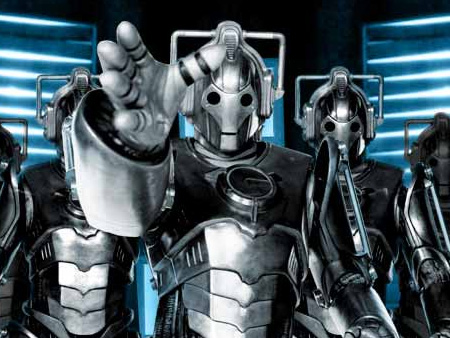Human.2 : A Look at Gender and Humanity in the Doctor Who-verse
Much of my interest in science fiction originates from the humanization of technology and the concept of glancing into the future. Our discussions of the cyborg (and the female cyborg) led me to look at what defines a cyborg. What makes something inhuman? What makes something gendered? Though for quite some time, I floundered with these questions, I feel that one science fiction television series, Doctor Who, has developed some potential answers to the aforementioned questions.
For a bit of background, Doctor Who is the longest running science fiction television show, airing from 1963 until present. Doctor Who, created by Russell T Davies, features the character of The Doctor, who is a time-traveling alien, and his “companions.” In 2005, Russell T Davies premiered a series called Torchwood (an anagram of ‘Doctor Who’) that was an “adult Doctor Who,” focusing on an underground organization that deals with alien life. Both of these series feature a villainous race known as the Cybermen, emotionless metal men striving for world domination, as always.
To focus first on the most immediately class-relevant topic, Torchwood presented their audience with something never done on this show before, a female cyberman. Until this particular episode (1×04: Cyberwoman), all Cybermen were genderless, fully encased in metal suits.
In one episode, the Doctor removes the emotion inhibitor from a Cyberman and discovers the memories of a woman named Sally are still present. He and his companion find this revelation all the more shocking because the cyborg was a woman. Which almost implies that the “default” gender is male, in their minds. Because the Doctor and his compatriot are both aware that men and women are converted with equal regularity, it should come as no surprise to them that a Cyberman could be a woman. The fact that it does implies something interesting: the fact that women are so closely (and perhaps stereotypically) linked with emotionality makes the removal of those emotions all the more jarring.
Lisa Hallett is introduced as the girlfriend of one of the main characters who had been partially converted by the Cybermen army. As a result, she appeared human, except for the parts of her that were completely covered in metal. The first reaction shown in the episode to Lisa is one of pity. Because she has been so horribly altered, Ianto’s sole goal in the episode is to return her to “being human.” The second reaction to Lisa is the doctor’s expression of her “beauty,” said while he feels all the areas of exposed flesh. Which provides us with the crux of the issue: why is Lisa sexualized while her fellow Cybermen counterparts are so feared, and definitely never considered in a romantic light?
I believe the answer to this question pertains to the Cybermen’s lack of humanity. Humanity, in the Doctor Who verse, is described as the presence of emotions, “the one thing that makes them human.” Also, while humans prize emotions and imagination (uniqueness, as well), the Cybermen believe that beauty comes from unity, from uniformity. The creation of a Cyberman is the removal of a human brain, and nervous system, and implanting those into a cybernetic body. The final step in the process is an emotion inhibitor. The emotion inhibitor suppresses all guilt, pain, fear, and love from the person, making them into a personality-less machine.
However, until the emotion inhibitor is engaged, these cyborgs are still regarded as human. The Cybermen are not beautiful, or sexual, because they lack the thing that humans find attractive, emotions. Lisa, because she is a cyborg with a partially functioning emotional system, is still humanized, and therefore sympathized with. The minute her emotion inhibitor takes effect, she transforms from the victim to the villain, and must immediately be terminated. It is also interesting to note that she also seems to transform into a gender-less entity. Her voice becomes harsher, less feminine, and the camera also pans to her and away quickly, much like the filming of movie monsters. By becoming inhuman and de-gendered, Lisa has become a terror.
So, there is a grey area present. If humanity continues to be defined by the presence of emotions, then any number of mechanical implants can be done to someone and as long as they retain their feelings, we still call them human. What, then, can be said for the robots and androids that are programmed to “feel?” There may be no flesh involved, but following from Doctor Who’s definition, those human constructs are as much human as their creators. I believe it is therefore necessary to further enhance our interpretation of “humanity,” as something organic.
What makes the concept of the Cybermen so terrifying to us, as a race, is the loss of what we define as inherent human qualities: emotions, gender, imagination, flesh. While we have discussed the presence of a “gender spectrum,” composed of more than just the gender binary, this spectrum in no way removes the concept of gender entirely. The Cybermen’s “upgrade” offers uniformity but the death of humanity, and that is a most frightening concept.
For those willing and wanting, here is a link to one of the more recent (and notable) incidents between The Doctor and the Cybermen.
Comments are closed.



I’d hoped for papers, this time ‘round, that were willing to “argue” using images as well as words—so thanks for rising to the challenge, and letting me “see” the cyborgs you are discussing.
Those images are more clear to me, though, than what you use them to “mean.” I understand the stereotypical association of women w/ emotion, which is highlighted by the Doctor’s shocked discovery of Sally’s memories. I think I also understand the sexualization of women that is brought into focus by the Doctor’s “feeling up” Lisa.
But what I don’t follow is the argument that (should?) follow from those descriptions. Are you using them to challenge the definition of humans as organisms w/ emotions? Expanding the definition of humans to include “emotions, gender, imagination, flesh”? (If so, you’ve only discussed the first and last of the qualities in that catalogue).
Your last comment seems to highlight the importance of uniqueness, of human variety, as distinct from the value that Cybermen place on uniformity—but I didn’t see that idea developed earlier in the paper, and am not sure how it works in relationship to the other observations regarding emotionality and the flesh.
Help!